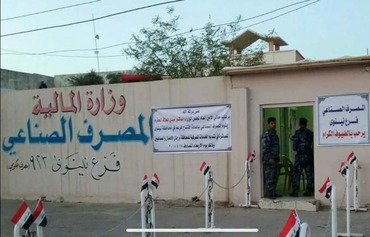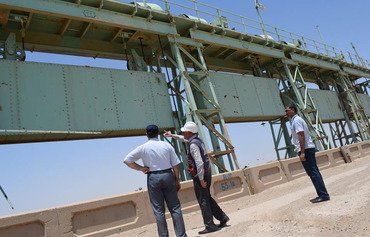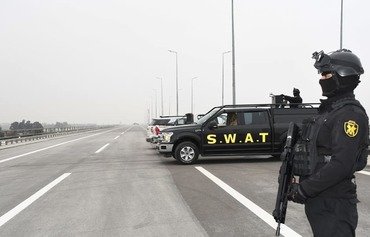Reconstruction in Anbar is gaining momentum despite limited financial resources to erase the effects of the destruction brought on by more than three years of "Islamic State of Iraq and Syria" (ISIS) rule.
The local government is moving on several fronts to overcome the challenges facing reconstruction, the most significant of which is the lack of financial support, officials said.
Anbar "is facing cash shortages", said provincial council spokesman Eid Ammash.
"Our province has only received three billion Iraqi dinars ($2.5 million) from its already limited allocation of 17.4 billion dinars ($14.6 million) from last year’s [2017] budget," he told Diyaruna.
Ammash said this amount is only enough for limited reconstruction work.
Large-scale reconstruction projects should be funded by the Iraqi government and international partners such as the UNDP, he said.
"We [the local government] are merely beneficiaries. We raise a proposal to the relevant authorities and await implementation and handover," he explained.
International support
The UNDP supports 408 reconstruction projects, he said, some of which have been completed while others are in progress, and some have been outsourced to specialised companies.
These projects include the rehabilitation of schools, hospitals, bridges and water and power plants.
Fighting has left extensive damage in many cities in Anbar, most notably Ramadi and Fallujah, with destruction reaching 80% in some cities.
"There is on the ground progress now but the province still needs billions of dinars to restore everything to how it used to be," he said.
"This represents a huge challenge that we are trying to overcome with the means available to us," he said. "We are approaching local investors, businessmen and ambassadors of foreign countries to help with the reconstruction effort."
In 2017, Iraq received a 500 million euro ($590 million) loan from Germany and another $350 million loan from the World Bank.
It also received a $100 million grant from Kuwait and a $9 million grant from China.
US Deputy Chief of Mission at the American embassy in Iraq Joey Hood on December 21st said the US has allocated nearly $2 billion dollars for the reconstruction of Anbar as part of the UNDP projects in Iraq.
Ali Farhan, deputy mayor of Anbar, said the money allocated for reconstruction from these grants and loans is not deposited with the local government.
"These funds are earmarked for reconstruction projects via the national fund for reconstruction of areas affected by terrorist operations and via international organisations," he told Diyaruna.
All funds are disbursed by donors to the relevant Iraqi ministries in tranches after the completion of each stage of the project, he added.
Reconstruction in Ramadi and Fallujah has been gaining momentum since 2016 and is moving at a good pace in spite of funding shortages, Farhan said.
Diversifying funding sources
The Ministry of Migration and Displacement has allocated "30 billion dinars ($25.2 million) to cover small-sized projects to restore stability, but the entire amount has yet to be released", he said.
The World Bank has also approved the allocation of $25 million to finance reconstruction in the province, but the decision has not yet been implemented, he added.
"We now hope to diversify our funding sources. We have prepared the necessary surveys and data on urgent reconstruction projects so we can present to the donor conference that is going to be held in Kuwait [in February]," he said.
The Iraqi government is mounting an intensive campaign to enlist international companies to invest in Anbar, Farhan said.
"Our region is rich in natural resources and this is an important factor in attracting direct foreign investment," he said.
Official delegations from Anbar province have recently visited several foreign countries, including France and South Korea, to meet with companies interested in investing in Anbar and propose joint economic partnerships.
Limited funding is a problem that all provinces plagued by terrorism are facing and not just Anbar, said Sadiq al-Bahadli who teaches finance and banking at al-Mustansiriya University.
This is due to the extensive level of damage in these provinces, which the Iraqi government alone cannot fix, particularly since it is already strapped for cash, he told Diyaruna.
It is important to open the door for investment and provide a competitive economic landscape to stimulate development, he said.
This includes enhancing the work of local banks to have them provide soft loans to residents that would help them start small projects and repair their homes.

![Workers pave a road in Ramadi last November as part of ongoing efforts to rebuild the city after more than three years of 'Islamic State of Iraq and Syria' rule. [Photo from the Ramadi mayor Facebook page]](/cnmi_di/images/2018/01/11/10984-iraq-fallujah-rebuild-600_384.jpg)






